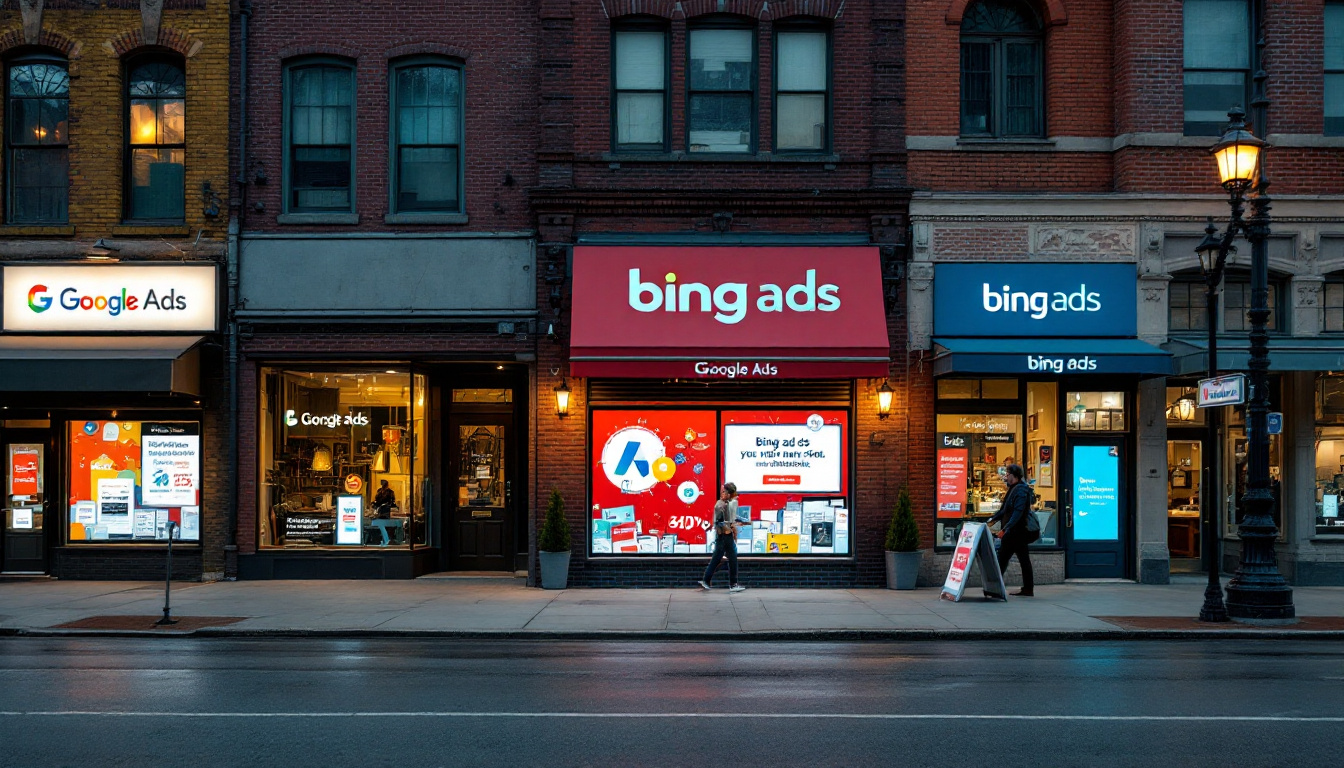Google Ads vs. Bing Ads for Memphis, TN Businesses: Which is Better?

In the world of digital marketing, choosing the right advertising platform can make all the difference for businesses. In Memphis, TN, two of the leading pay-per-click (PPC) advertising platforms are Google Ads and Bing Ads. Each has its strengths and weaknesses, making the decision of which platform to use a critical one for local businesses aiming to enhance their online presence and drive sales.
Key differences between Google Ads and Bing Ads
The primary difference between Google Ads and Bing Ads is their respective reach and audience. Google Ads commands the largest market share, boasting approximately 92% of search engine traffic worldwide. In contrast, Bing Ads, while holding only about 6%, has unique features that may benefit specific businesses. For instance, Bing's demographic profile skews slightly older, which can be advantageous for brands targeting mature consumers. Additionally, Bing users often have higher disposable incomes, making them a potentially lucrative audience for certain industries, such as luxury goods or financial services.

Another notable difference lies in the ad creation and management process. Google Ads offers more sophisticated tools for targeting and analytics, allowing advertisers to refine their campaigns extensively. Bing Ads, however, tends to provide a more straightforward and user-friendly interface, which can be advantageous for businesses that are new to PPC advertising. This simplicity can lead to quicker campaign launches and less time spent on training, enabling businesses to focus more on their core operations rather than getting bogged down in the intricacies of ad management.
Ease of Use
For small business owners or those just starting with digital marketing, the learning curve associated with Google Ads can be steep. Many users find Bing Ads easier to navigate, primarily due to its simpler setup and management features. The streamlined process of creating ads and managing budgets on Bing can empower smaller teams to execute campaigns without needing extensive technical know-how. This accessibility can be a game-changer for businesses that may not have dedicated marketing departments or resources.
Nonetheless, Google's extensive resources, tutorials, and community support can mitigate this challenge. Each platform has its level of complexity, making it essential to assess your team's familiarity with digital advertising tools when selecting between the two. Moreover, Google Ads' robust ecosystem includes integrations with other Google services, such as Google Analytics and YouTube, offering a more comprehensive view of campaign performance across multiple channels.
Ad Formats and Features
Both platforms offer various ad formats, including text ads, shopping ads, and display ads, though Google Ads typically provides a wider array of options. Google has also incorporated features, such as responsive search ads and dynamic search ads, which help automate and optimize ad placements. These advanced formats can significantly enhance ad performance by tailoring messages to user queries in real-time, thereby increasing click-through rates and conversions.
Bing, on the other hand, offers unique features like audience targeting through LinkedIn profiles, which may appeal to businesses in specific B2B sectors. This integration allows advertisers to reach a professional audience more effectively, leveraging LinkedIn's rich data to refine targeting strategies. Each platform continually evolves, making it vital for businesses to stay informed about new features and updates that could impact campaign performance. Additionally, understanding the nuances of each platform's audience can lead to more effective ad spend, ensuring that marketing budgets are allocated efficiently to maximize return on investment.
Audience demographics for each platform in Memphis, TN
Understanding the audience demographics for Google Ads and Bing Ads is crucial for Memphis businesses aiming to target the right consumers effectively. Google Ads typically attracts a younger audience, with a significant proportion of users aged 18-34. This demographic is tech-savvy and often engages with a wide array of online content, from social media platforms to streaming services. They are not only consumers but also influencers, often sharing their experiences and recommendations online, which can amplify a brand's reach through organic word-of-mouth.
Bing Ads, conversely, tends to attract an older audience, with a notable portion of users aged 35 and above. This demographic may be less familiar with newer technologies, making it essential to tailor marketing strategies accordingly. They often value trust and reliability in brands, which means that advertising messages should emphasize quality and customer service. Additionally, this group is more likely to engage with content that provides detailed information, such as reviews and comparisons, which can inform their purchasing decisions.
Market Segmentation
Businesses targeting younger demographics might find Google Ads more beneficial due to its broader reach and advanced targeting capabilities. With features like demographic targeting and interest-based advertising, companies can create highly personalized campaigns that resonate with this audience. Meanwhile, those focusing on older audiences or specific sectors, such as finance and healthcare, may benefit from Bing's unique audience targeting options. Bing's integration with Microsoft products also allows for a seamless advertising experience, particularly for businesses that cater to professionals who use these tools regularly.
Local vs. National Reach
Geographic targeting is another critical factor. Both platforms allow for local targeting; however, Memphis businesses should consider where their audience primarily conducts searches. If targeting local keywords and audiences, ensuring that your ads reach the right geographic area on both platforms is crucial for maximizing ROI. Moreover, businesses can leverage local SEO strategies in conjunction with paid ads to enhance visibility. Engaging with community events or local influencers can also help to solidify a brand's presence in the Memphis market, making it more relatable to local consumers. This dual approach of combining local engagement with targeted advertising can create a more comprehensive marketing strategy that resonates with the unique culture and values of the Memphis community.
Cost comparison: CPC and ROI
Cost per click (CPC) and return on investment (ROI) are fundamental metrics that businesses must evaluate when choosing between Google Ads and Bing Ads. Generally, Bing Ads offers lower CPCs due to less competition, making it an attractive option for businesses looking to minimize advertising costs.
Profitability, however, isn't solely about CPC. Google Ads may demand higher costs but can yield more conversions due to its extensive user base. For Memphis businesses with limited budgets, it’s essential to assess how their target audience interacts with each platform to calculate potential ROI effectively. Understanding the demographics and behavior of users on each platform can provide valuable insights into which advertising channel may be more effective for specific campaigns. For instance, if a business is targeting a younger demographic, Google Ads might be the better choice, given its popularity among this age group.
Budget Constraints
When operating under a tight budget, utilizing Bing Ads may allow Memphis businesses to attract clicks more affordably, ensuring that marketing dollars stretch further. However, companies must keep a close watch on conversion rates to ensure that lower costs are translating into sales. Additionally, it’s crucial to consider the overall customer journey; lower CPCs might not always lead to higher profitability if the quality of traffic differs significantly. Businesses should also factor in the lifetime value of customers acquired through each platform, as this can greatly influence long-term ROI.
Performance Metrics
Regular analysis of performance metrics will provide insight into which platform delivers the best results for your business. A/B testing across both Google Ads and Bing Ads campaigns can further streamline your approach and enhance your overall marketing strategy. Beyond just clicks and conversions, metrics such as click-through rates (CTR), cost per acquisition (CPA), and customer engagement levels should also be monitored. These indicators can help businesses fine-tune their ad copy, targeting, and bidding strategies, ensuring that they are not only attracting traffic but also engaging potential customers effectively. Furthermore, leveraging tools like Google Analytics can provide deeper insights into user behavior post-click, allowing for more informed decisions regarding future ad spend and campaign adjustments.
How to choose the right platform for your business
Choosing the right advertising platform requires careful consideration of several factors. Start by defining your target audience: Who are they? What are their online behaviors? Understanding your audience is paramount in identifying the most effective platform.
Next, evaluate your budget and resources. If you have a limited budget, Bing Ads might be the better option initially, especially if you can create campaigns that capitalize on lower costs. Conversely, if you have the resources to delve into more complex advertising strategies, Google Ads could be advantageous.
Testing and Analysis
Another crucial factor is testing. It's wise to run campaigns on both platforms for a set duration to gather data. Assessing conversion rates, customer engagement, and overall performance will guide your decision-making process.
Brand Goals
Consider your brand goals as well. If your objective is to increase brand visibility and reach, Google Ads may be the more effective choice. However, if your focus is on generating leads or sales, both platforms can offer valuable opportunities, depending on your audience.
Examples of businesses succeeding with both platforms
Local Memphis businesses have found success by employing both Google Ads and Bing Ads based on their unique needs. For example, a popular Memphis barbecue restaurant utilized Google Ads to target a younger audience during peak dining hours, resulting in significantly increased foot traffic.

Similarly, a Memphis financial services firm opted for Bing Ads to reach an older demographic interested in investment opportunities. The firm capitalized on Bing's audience targeting to attract local customers, resulting in a notable uplift in consultations.
Case Studies
The success stories of these businesses illustrate that the choice between Google Ads and Bing Ads should be influenced by audience targeting, budget considerations, and brand objectives. By analyzing real-world applications and being flexible in their approaches, Memphis businesses can maximize their advertising effectiveness.
Ultimately, the answer to which platform is better depends largely on individual business goals and market dynamics. Tailoring your approach will enable your company to tap into the rich potential both platforms offer.

As a Google Ads expert, I bring proven expertise in optimizing advertising campaigns to maximize ROI.
I specialize in sharing advanced strategies and targeted tips to refine Google Ads campaign management.
Committed to staying ahead of the latest trends and algorithms, I ensure that my clients receive cutting-edge solutions.
My passion for digital marketing and my ability to interpret data for strategic insights enable me to offer high-level consulting that aims to exceed expectations.



















